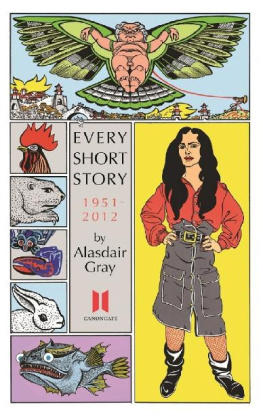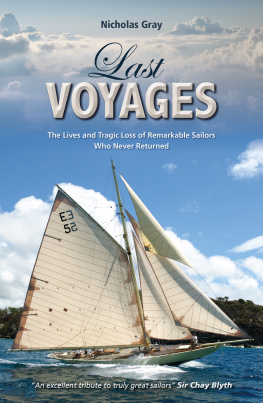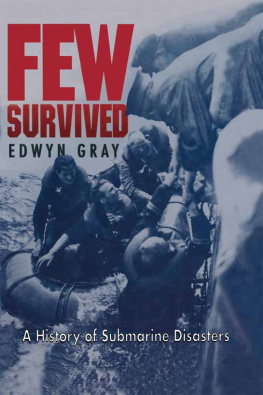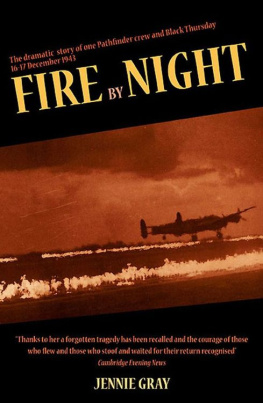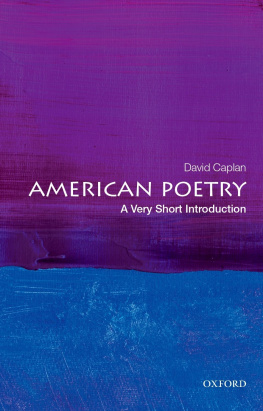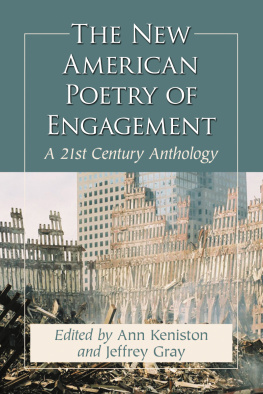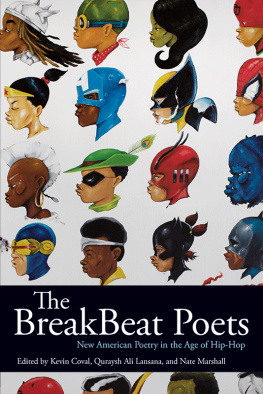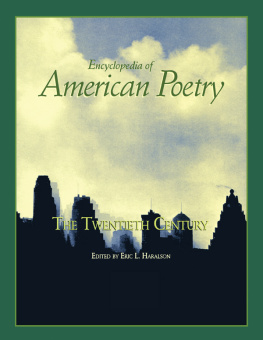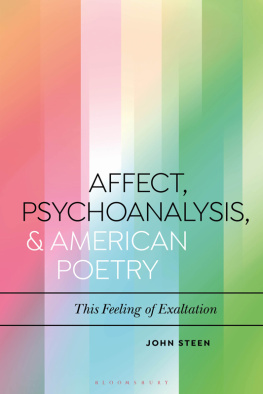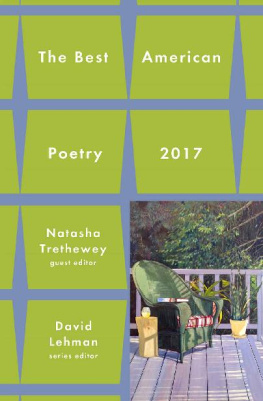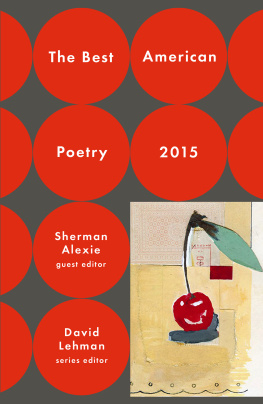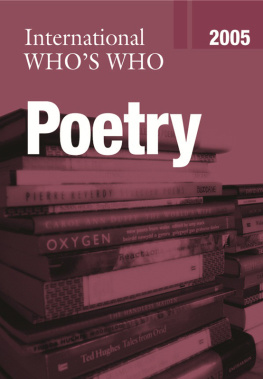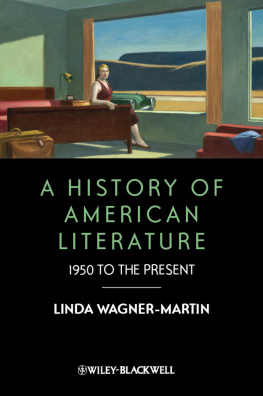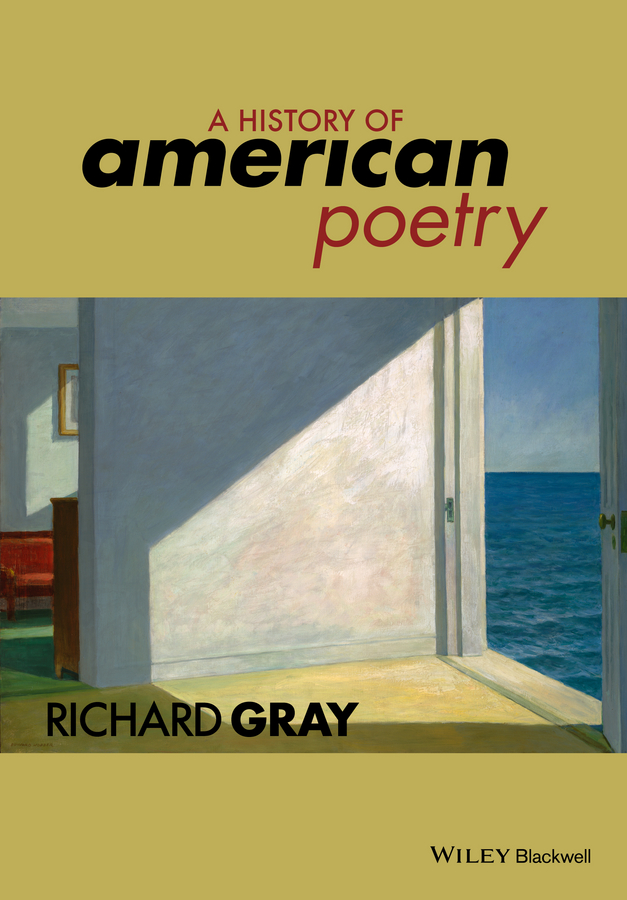
CONTENTS
Guide
Pages
Also by Richard Gray:
A History of American Literature, Second Edition
A Brief History of American Literature
After the Fall: American Literature Since 9/11
A Companion to the Literature and Culture of the American South
(edited with Owen Robinson)
A HISTORY OF american poetry
RICHARD GRAY
This edition first published 2015
2015 John Wiley & Sons, Ltd.
Registered Office
John Wiley & Sons, Ltd, The Atrium, Southern Gate, Chichester, West Sussex, PO19 8SQ, UK
Editorial Offices
350 Main Street, Malden, MA 02148-5020, USA
9600 Garsington Road, Oxford, OX4 2DQ, UK
The Atrium, Southern Gate, Chichester, West Sussex, PO19 8SQ, UK
For details of our global editorial offices, for customer services, and for information about how to apply for permission to reuse the copyright material in this book please see our website at www.wiley.com/wiley-blackwell.
The right of Richard Gray to be identified as the author of this work has been asserted in accordance with the UK Copyright, Designs and Patents Act 1988.
All rights reserved. No part of this publication may be reproduced, stored in a retrieval system, or transmitted, in any form or by any means, electronic, mechanical, photocopying, recording or otherwise, except as permitted by the UK Copyright, Designs and Patents Act 1988, without the prior permission of the publisher.
Wiley also publishes its books in a variety of electronic formats. Some content that appears in print may not be available in electronic books.
Designations used by companies to distinguish their products are often claimed as trademarks. All brand names and product names used in this book are trade names, service marks, trademarks or registered trademarks of their respective owners. The publisher is not associated with any product or vendor mentioned in this book.
Limit of Liability/Disclaimer of Warranty: While the publisher and author have used their best efforts in preparing this book, they make no representations or warranties with respect to the accuracy or completeness of the contents of this book and specifically disclaim any implied warranties of merchantability or fitness for a particular purpose. It is sold on the understanding that the publisher is not engaged in rendering professional services and neither the publisher nor the author shall be liable for damages arising herefrom. If professional advice or other expert assistance is required, the services of a competent professional should be sought.
Library of Congress Cataloging-in-Publication Data
Gray, Richard, 1944
A history of American poetry / Richard Gray.
pagescm
Includes index.
ISBN 978-1-118-79534-7 (cloth) ISBN 978-1-118-79535-4 (pbk.)1.American poetryHistory and criticism.I.Title.
PS303.G73 2015
811.009dc23
2014040569
A catalogue record for this book is available from the British Library.
Cover image: Edward Hopper, Rooms by the Sea, 1951, oil on canvas. Yale University Art Gallery, Bequest of Stephen Carlton Clark, B.A. 1903, 1961.18.29
To
Sheona
Preface and Acknowledgments
In this history of American poetry, I have tried to be faithful to the sheer range and plurality of the American poetic tradition. I have also attempted to focus on both individual poets and the poetic communities to which they variously belong, and to anchor my discussion in specific, significant or symptomatic poems, and the imaginative journeys on which they take us. It is, after all, the experience of reading the single poem and encountering the voice of a singular poet that fires the readers imagination into life; and so it is to this that any study of poetry must eventually return, no matter how detailed or protracted its investigation may be of poetrys social and ideological underpinnings.
One is the Population , Emily Dickinson wrote in one of her most frequently quoted poems, / Numerous enough / This Ecstatic Nation / Seek it is Yourself.
In the opening chapter of this book, and in the first section of the second chapter, I expand on this idea of any poetic tradition and, in this particular instance, the American poetic tradition as a great, open dialogue that, strictly speaking, never reaches an end. I also suggest what I hope are other useful contexts for looking at, understanding, and appreciating American poetry. After that, the structure of this book is basically chronological and probably needs no further explanation. It might be worth adding, however, that the final chapter is longer than the others, in part because it is here I discuss, not just American poetry of the last few decades, but also Chicano/a and Latino/a poetry, Asian American poetry, and Native American poetry of the contemporary period and their antecedents. This, after all, seemed the appropriate place to emphasize both the growing importance of these poetic traditions and their specific histories, the ways in which they have added to the rich cultural mosaic that is America and American poetry.
All that remains is for me to thank the people who have helped with this book. I owe a special debt of gratitude to my friends, colleagues, and students at the University of Essex. When the Department of Literature was established at Essex by the poet and critic Donald Davie, it had a special intellectual investment in American poetry. That was signaled, among other things, by the number of distinguished American poets who taught in the Department in its first twenty or so years, among them Ted Berrigan, Ed Dorn, and Robert Lowell, and the even greater number of equally distinguished American poets who visited for shorter or longer periods to give readings and classes. That interest in American poetry attracted a large mix of lively and talented students at both undergraduate and graduate levels, many of whom have become well-known poets themselves; and although Essex like all British universities, unfortunately has become increasingly bureaucratized, over-managed, and less intellectually committed to the study of subjects such as poetry, the investment has still not been exhausted; the interest in poetry, the energy and the commitment are still there, and there is still a lot of exciting work being produced and discussed. I owe an immense debt both to the Department and to those in the Department who have fostered and encouraged my interest in this subject; this book would not have been possible, quite frankly, if I had worked and taught anywhere else.
I cannot mention everyone who has helped me, but it would be wrong not to mention my friend and colleague of over forty years, Herbie Butterfield, my former colleagues, the late Joe Allard, the late Francis Barker, Gordon Brotherston, the late George Dekker, Maria Cristina Fumagalli, Clive Hart, Jack Hill, Peter Hulme, Tom Raworth, the late Arthur Terry, Phil Terry, Dudley Young, and a former student who is now my colleague, Owen Robinson. I also need to thank friends at the British Academy who share my passion for poetry, among them Michael Bell, Andrew Hook, Jon Stallworthy, and Wynn Thomas, particular friends and colleagues at other universities in Great Britain and elsewhere, including Sacvan Bercovitch, Kasia Boddy, Bob Brinkmeyer, Susan Castillo, Richard Ellis, the late Kate Fullbrook, Mick Gidley, Paul Giles, Richard Godden, Jan Nordby Gretlund, Fred Hobson, Lothar Honnighausen, the late Stuart Kidd, Burt Kimmelman, Pearl McHaney, Tom McHaney, Sharon Monteith, Peter Nicholls, the late Peter Nicolaisen, Marjorie Perloff, the late Noel Polk, Michael Rothberg, Hans Skei, the late Charles Swann, Helen Taylor, Nahem Yousaf, and Waldemar Zacharasiewicz. There are also present and former doctoral students to whom I owe a particular debt, some of them poets, others now academics, and still others both, including Katya Alkhateeb, Abdul Atteh, Alaa Barhoom, Emily Barker, Michael Broek, Sophie Cansdale, John Cant, Kate Charlton-Jones, Chin-Jau Chyan, Pip Dandy, Rebecca Degler, Yamina Deramchia, Carl Dimitri, Veronique Eich, Ruth Frendo, Mike Gray, Iman Hami, Paul Harper, Roger Haydon, Teri Hill, Daniel Jupp, Hamada Kassam, Brian Marley, John Muckle, John Murphy, Chris Nawrat, Brendon Nicholls, Sawsan Qashgari, John Rabbetts, Theo Savvas, Robert Snell, James Stannard, Mick Stevens, Helen Turner, Theresa Welford, Luke Whiting, Andrew Wilson, Aoi Yamada, and Rouhollah Zarei.
Next page


